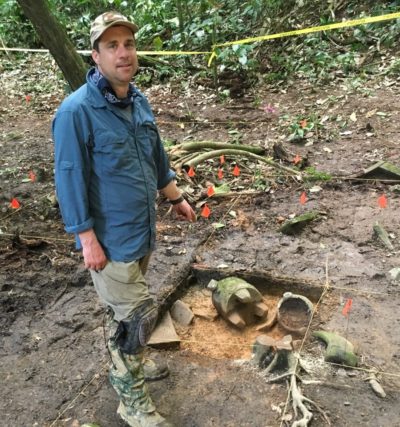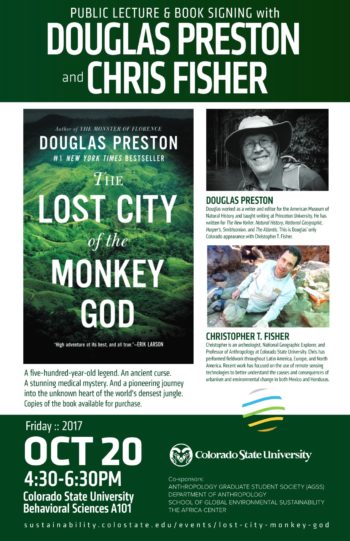
During a writing career that spans nearly 40 years, Douglas Preston has experienced things most people would only dream of.
From retracing the path of Coronado in the southwest, to visiting a rarely-seen temple deep in the Cambodian jungle, to becoming the first human in 3,000 years to see an Egyptian tomb, Preston has traveled the world seeking answers to some of history’s greatest mysteries. Nothing, though, compares to the experience he shared with Colorado State University archaeologist Chris Fisher in the wilds of Honduras.
Unique experience
“I’ve been a backpacker most of my life, and I’ve spent many months in isolated areas – but never anything like this,” he said. “It really is a lost world – it’s what the world was like before humans came along to mess things up.”
Preston will discuss his experience and the book it inspired – “The Lost City of the Monkey God” – at a lecture from 4:30 p.m. to 6:30 p.m. Friday, Oct. 20, in A101 of the Behavioral Sciences Building on the Colorado State University campus. The event is free and open to the public.
Preston, a former writer and editor the American Museum of Natural History, will be joined by Fisher, a professor in the Department of Anthropology and Geography in CSU’s College of Liberal Arts. Fisher is a renowned scholar of Mesomerican archaeology and one of the world’s foremost experts on the use of LiDAR (light imaging, direction and ranging) in modern archaeology.
Remarkable discovery
It was Fisher who first studied LiDAR images from the Honduran site and determined that several – perhaps hundreds – of manmade structures were hidden by the thick jungle canopy. Fisher joined Preston, writing for National Geographic, on an international research team that explored the area in 2015. The team discovered dozens of artifacts and evidence of a large pre-Colombian city that was abandoned sometime around 1500 AD.
 “The thing that has stayed with me the most is that we were in an area completely untouched by humans for many centuries,” Preston said. “The animals had never seen people, and were completely unafraid of us – sometimes disconcertingly so!
“The thing that has stayed with me the most is that we were in an area completely untouched by humans for many centuries,” Preston said. “The animals had never seen people, and were completely unafraid of us – sometimes disconcertingly so!
“It’s remarkable to think you could find a lost city of the surface of the earth in the 21st century – usually modern archaeological discoveries are much more modest – but that’s what happened. It really was a unique experience.”
No. 1 bestseller
Preston’s book reached No. 1 on the New York Times Bestseller List, and the new paperback version reached No. 3. In addition to discussing the book, Preston will share rare photos and video clips with the audience – and the future of LiDAR in archaeology.
“Chris will be speaking as well and talking about these very mysterious people who lived in the city and about whom we know very little,” Preston said. “Anyone who is interested in archaeology will be enthralled and captivated by this story. But it’s not just the discovery – it’s the story about how LiDAR and extremely cutting-edge technology is being used in extraordinary ways, thanks to people like Chris.”
Preston and Fisher will be signing copies of “The Lost City of the Monkey God,” which will be available for purchase.
The event is sponsored by the Department of Anthropology and Geography, SoGES, The Africa Center and the Anthropology Graduate Student Society.